The Dead Milkmen are Still Dangerous.
 Text by Beth Ann Downey. Images by Jared Gruenwald.
Text by Beth Ann Downey. Images by Jared Gruenwald.
A young looking 19-year-old sits in the first row of the upper-floor auditorium in the Central Free Library of Philadelphia, enthralled by The Dead Milkmen performing an acoustic show in front of her.
The event is part of local author Andrew Ervin’s book release party for “Burning Down George Orwell’s House.” He’s a friend of The Milkmen, and it’s hard to tell who of the hundreds of people in attendance came to hear his reading or their music. But what’s apparent about the Philadelphia-based punk band – with its more than 30-year stake in the local scene – is that people of all ages, shapes and sizes have come to enjoy their music. Some have young children. Some have gray, braided hair. Some sport shirts and bowties, others are dressed in casual tourist garb or sport black denim vests and purple mohawks.
After the performance, that 19-year-old in the front row snags frontman Rodney Linderman to sign her T-shirt before heading for the elevator. For her, the music of The Dead Milkmen is more about nostalgia than relevance.
“My dad was only 24 when he had me, not much older than I am now,” says Jade Richmond, a Temple University student. “The music he was listening to, he wanted me to listen to because that’s what he considered good music. So listening to it now reminds me of being a little kid and sitting in the back of my dad’s car, rocking out to The Dead Milkmen.”
The Dead Milkmen’s music presumably conjures many memories for many people, and means a lot to a lot of Philadelphians. Maybe people reminisce about the basement shows they attended in the early ’80s when the band started. Maybe they can imagine themselves walking down South Street as the punk haven it once was or can remember how it felt to cruise down to the Jersey Shore for a weekend or a summer.
As a satirical band – forever a perpetuator of wacky, intricate and out-of-the-box lyrics to complement a clean musical approach to punk – The Dead Milkmen brought humor to a genre and a scene they say was full of people taking themselves too seriously at the time. From the absurdity of “Gorilla Girl” to the mundaneness in “Punk Rock Girl,” the commentary of “Beach Party Vietnam” to the insensitivity of “Takin’ Retards To The Zoo,” the band has undoubtedly made fans laugh multiple times through the years.
But they’ve also made them think, or possibly even cry. They admit their lyrics are dark, and Linderman, otherwise known as Rodney Anonymous, jokes that they are sometimes even “a desperate cry for help.”
Dark humor is something he feels audiences often need from music, but has become harder to find in modern times.
“There’s a whole genre of what I call ‘happy, clappy’ music out now,” he says while perched on a plastic chair in the auditorium after the show. “It’s like, ‘Hey everybody, we’re having a good time, yeah!’ But I’m not having a good time. I’m angry. If you were angry in the 1980s, most of the music was Michael Jackson and basically people would say, ‘Come on, it doesn’t matter if you’re black or white.’ Well, it does if the cops are shooting at you! So I think that’s how bands like Black Flag and those began to get the undercurrent because not everybody was buying into that big lie. I think that’s why you really need somebody out there saying, ‘Hey, it’s not all pretty. Here’s an option for dealing with it.’”
Just as The Dead Milkmen may remember the 1980s differently than a Michael Jackson fan, their view of Philadelphia is different than that of current city-dwelling youths or young adults.
There was much less to do, they say, and places like the Northern Liberties, Fishtown and even South Street were without the booming businesses and attractions they have today.
The bandmates also remember punk music as much less restrictive than it is today in terms of maintaining a certain style.
“It was more an attitude and it was more DIY,” says guitarist and vocalist Joe Genaro. “The whole idea of the punk thing was that you didn’t even need to know too much about music. You could just play it.”
Linderman says punk bands arose back then due to two key factors: desperation and boredom.
“You literally had nothing to do, so people formed bands so that they had something to do,” he says. “It was like living on the prairie in the 18th century, where people were like, ‘Oh, I’m going to play the fiddle now.’ People didn’t like fiddle music but it was something to do. It was better than going out and sticking your face in the blizzard. So yeah, I would say that that sense of desperation, which I miss oddly enough, isn’t there anymore.”
The times and punk music have changed but the members of The Dead Milkmen haven’t really, aside from aging. They constantly joke with one another and carry absolutely no sense of ego or palpable realization of rock stardom. Linderman is loud and erratic. Genaro is quiet and guarded. Drummer Dean Sabatino is straightforward and level-headed. In other words, Sabatino seems like the one used to following the rules, Linderman the one used to breaking them and Genaro the one to run away at the first sign of conflict.
A steadfastness of self has allowed their music to change but remain relevant, as well as satirical and poignant at the same time.
“If you scratch the surface of our songs, they’re about being broke, they’re about junkies, they’re about crazy people in small towns, they’re about homophobes,” Linderman says. “So I never particularly found that we were a humorous band. I’m glad that people have to categorize it that way. Otherwise, they’d be as depressed as I am.”
The Dead Milkmen found fame when their debut album, Big Lizard in My Backyard and the song “Bitchin’ Camaro” got picked up on the college radio circuit. That led to the immense success of “Punk Rock Girl,” a single from their 1988 album Beelzebubba, which made it into MTV rotation.
“That was back when college radio meant something,” remembers Sabatino. “It doesn’t mean anything anymore really.”
“The radio used to be a life changing thing,” adds Linderman. “I love Internet radio now because it’s kind of, in some ways, the same way. When I get an Internet station that is regularly updated and the DJs are good, I love that. That’s kind of the magic of it. But I don’t think it will ever happen for young people again the way it happened for us, where you would tune in to the radio and just be blown away by it.”
Just as the radio once had the capacity to make or break bands, getting picked up by a major label could also change an artist’s career overnight. But for offbeat punks like The Dead Milkmen, it came with a price. Linderman recalls the band’s time on Hollywood Records, from 1991 to 1995, and he immediately says, “It sucked.”
“Back then, the only way to get heard was to be on a label,” he says. “Now you can make an MP3. You can do it at home. You have basically a recording studio at home and you can get it out there.”
Genaro remembers the band making their own tapes so that they could go out on tour. That was around the time that DIY and independent labels started gaining ground. But before they knew it, they were swept up into a wave of industry frustration, poorly performing albums and the threat of being dropped.
The band announced its breakup in 1995. Twenty years later, what was undoubtedly a very stressful decision can be joked about.
“The hiatus period,” Genaro says. “I think Rodney describes it as the happiest time of his life.”
Everyone, including Linderman, laughs.
“Yeah, but I thought hiatus was a wolf-like animal that preyed upon sheep,” retorts Linderman. “Turns out that’s a hyena.”
Nowadays, there is one fewer original member of The Dead Milkmen to laugh at outlandish jokes or make his own. After spending the hiatus studying the Serbo-Croatian language and even moving to Serbia for a time to teach English, bassist Dave Schulthise committed suicide in March 2004.
Linderman, Genaro and Sabatino remember him as a prankster who would put ketchup packets on trolley tracks or have long conversations with service people from the 1-800 call lines he would dial from hotel lobbies. He also had routines he stuck to, like lining the inside of dresser drawers with wrapping paper before putting his clothes in.
He always read the news. He read a lot of books on tour. He was always interesting to talk to about political events. He was an impeccable musician.
He always seemed bored – and seemed to be doing something to counteract that boredom, according to Linderman.
“He did not care what you thought about him,” he says. “He was going to have some fun and he was going to live his life the way he wanted to. If he was in Yugoslavia and you drop bombs on him, well, he’s having a good time down in the bomb cellar while they drop the bombs.
The surviving members of the band reunited for two memorial shows at the Trocadero in November 2004. Dan Stevens – who was playing in a band called The Low Budgets with Genaro at the time – played bass for the shows. In 2008, Graham Williams – a promoter from Austin, Texas who had sang on The Dead Milkmen’s album Metaphysical Graffiti – asked the band to reunite as one of the headliners for his Fun Fun Fun Fest.
“We thought it would be a one-off thing, but it was so much fun, too,” says Genaro. “At least I remember it being fun. Then we decided to do it on a regular basis.”
The Milkmen kept Stevens on bass. The band has since released two studio albums since the reunion: 2011’s The King In Yellow and 2014’s Pretty Music For Pretty People.
Linderman says the band’s new material is more complex now that they can “get more than three chords together.”
“You don’t want to keep making the same record over and over again,” he says. “You sit at night and you’re playing around with your stuff at home and you’re like, ‘That’s a really weird sound. I wonder if we could use that.’”
Brian McTear of Miner Street Records, where The Milkmen recorded their two most recent albums, says the band exemplifies the path ahead for anyone with an aim to make music until they die.
“To be a ‘recording artist for life’ was never something all that many people could do,” McTear says. “Not even The Dead Milkmen, as they learned when their careers ran out in the mid ’90s. Rodney, Joe, Dean and Dan are heroes to me because they realized they could start up the band again, so they did it. Now they’ll likely make records decades beyond what they probably ever thought they’d do when they were kids.”
Making records is certainly a priority for The Milkmen, but it’s not all they’re doing nowadays. Stevens is a family man with three kids. Sabatino works as an interface designer for an international consulting company, lives in Media and has a wife and 16-year-old son. Linderman lives and works in the city as a change manager for a financial firm and has been married for 20 years. Genero, also still a city dweller, is single and works as a software quality assurance manager for a company that provides marketing and technology solutions for the education market.
It feels just as unusual for the band to now play to older audiences as it does to play to fans who weren’t even alive when the band started out.
“I want to shake young people and say, ‘Why aren’t you at an Angelspit show?’” says Linderman. “I’m always amazed because there are these great young bands.”
The Dead Milkmen are fans of numerous young bands, evidenced by Sabatino’s Psychic Teens shirt he wears during the library performance and Linderman’s diatribes about the genius of acts like Gothsicles and Santa Hates You.
It’s almost as if they don’t realize they receive the same admiration.
“I can recall numerous times where I might be showing a young punk band the studio, and in walks Dean to drop off some records,” writes McTear. “The band might not know who he is but the second I tell them, their eyes light up and they completely change their demeanor.”
Most career people enjoy being taken more seriously the longer they’re in a job. For The Dead Milkmen, the thought of being taken seriously is upsetting.
“It’s like we’re not even dangerous anymore,” says Linderman. “It’s like we’ve become avuncular. ‘Oh, aren’t they cute? Let’s let them play in the cemetery. They’re not going to touch the bodies.’ It’s kind of a thing that’s upsetting me now when I start thinking, ‘What can we do to upset people?’”



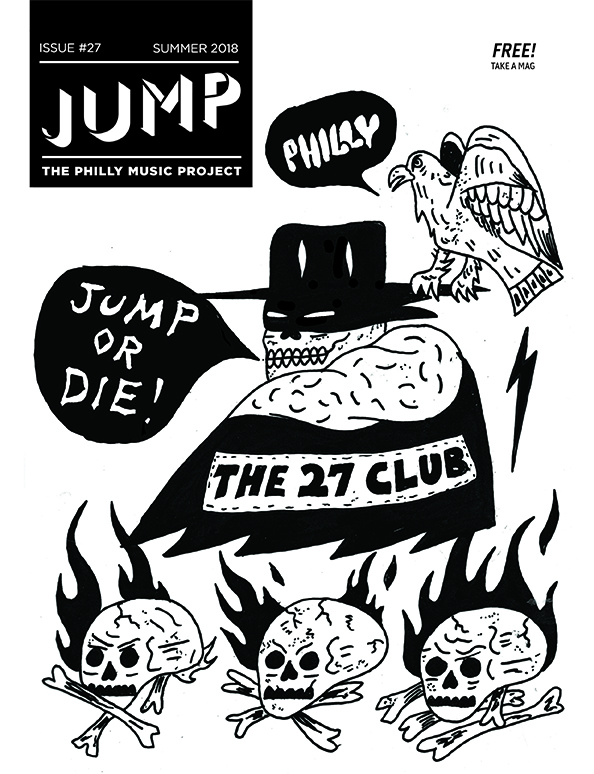

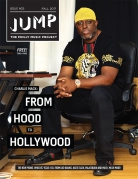

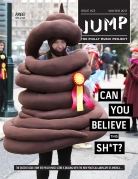
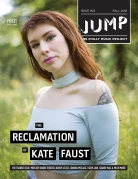
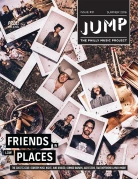



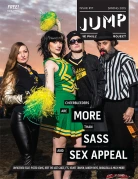
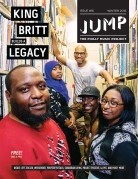





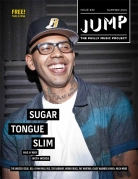
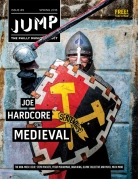
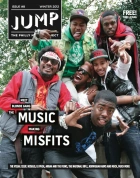
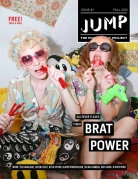









Comments are closed.